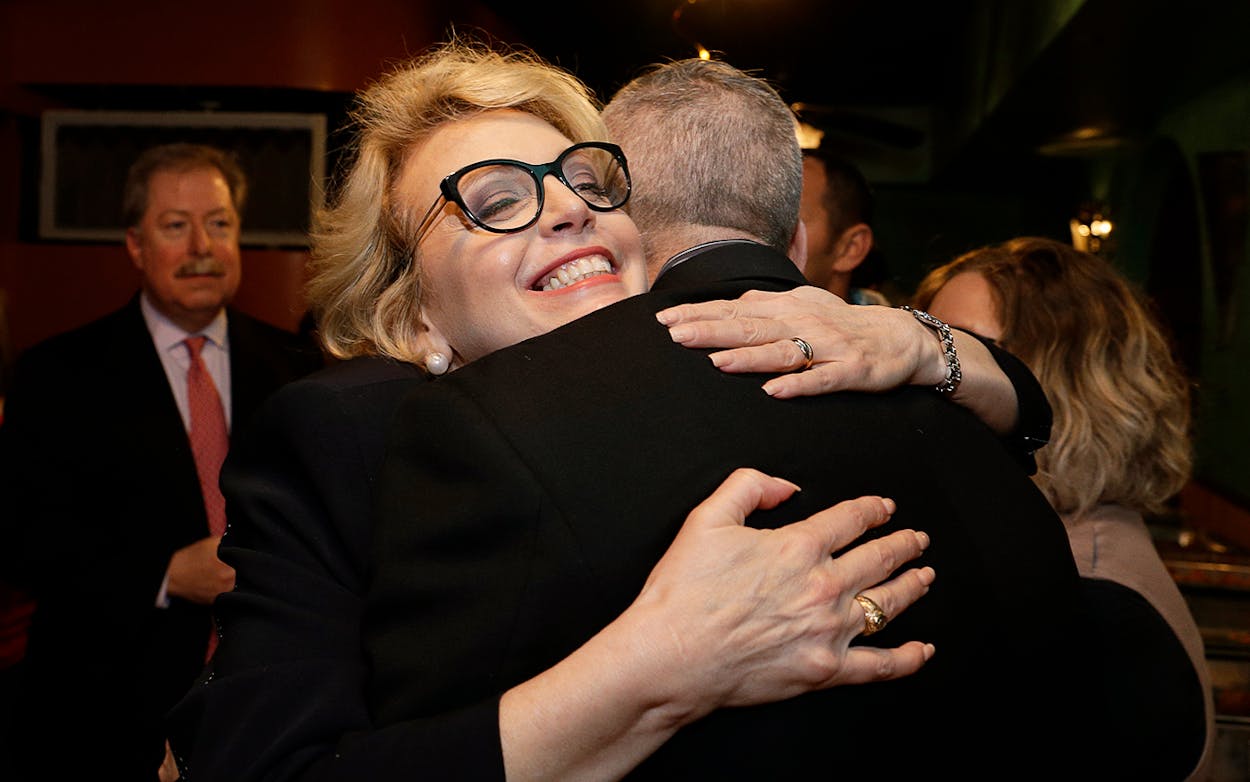On April 1, perhaps knowing that we all needed a break, Kathaleen Wall released a confounding political ad. With no advance warning, like Beyoncé might release an album. Here it is:
“China poisoned our people,” a scary voice intones as arrows labeled “CHINESE VIRUS” fly from China to the United States in an animated map. “Wall will cut off trade, aid, and support to China,” the voice continues. “China is a criminal enterprise masquerading as a sovereign nation. It’s time to fight back!”
Wall, a candidate in the Republican runoff in the Twenty-second Congressional District, which covers a southern chunk of greater Houston, is a very unusual candidate: she’s a staunch conservative who believes in large-scale wealth redistribution, which is to say, the distribution of her own prodigious wealth to campaign consultants. (Wall’s husband, Holly Frost, founded Texas Memory Systems, a tech firm that caters to the oil and gas business, and the pair are big-time GOP donors.) This is her second attempt to buy a congressional seat, following a failed bid for a nearby district in 2018, and she’s a long shot in this runoff given that her opponent attracted more than twice as many votes as she did in the first round of voting.
At first glance the ad seems to be a xenophobic Hail Mary, if one with inconsistent messaging: pause the video as the map flashes in the first seconds, and you’ll notice that the campaign has colored the Republic of China, or Taiwan, as part of Communist China. Nothing could make Beijing happier.
But couldn’t the ad be counterproductive? The district Wall seeks to represent contains the highest percentage of Asian Americans in Texas—about 20 percent. People of east Asian appearance all over the country have reported that they’re being blamed in some way for what Wall, like Trump, calls “the Chinese virus,” and that misplaced fear has kept some Americans away from Chinese restaurants and Asian markets. Didn’t Wall offend prospective voters?
There’s a lot of what we euphemistically call “demographic anxiety” in the Twenty-second, and the local GOP is torn between sometimes awkward outreach efforts to minority communities and efforts to tap white resentment of their influence. Other Republicans have struggled with the new status quo in the district. Last year, state representative Rick Miller had to retire after he told a reporter he thought it was “racist” that he was being opposed in his primary by two Asian Americans. In 2018, the Fort Bend Republican Party took out an ad in a newspaper read by the local South Asian community with a picture of Ganesh, the Hindu deity with the head of an elephant, asking readers if they’d rather worship an elephant or a donkey. And that year Pete Olson, the man Wall is seeking to replace, referred to his Democratic opponent Sri Kulkarni as an “Indo-American who is a carpetbagger,” a phrase in which, as the kids say, there is a lot to unpack.
The China-bashing fits into a national trend. In the last few weeks, Republicans have leaned really, really hard into the line that the coronavirus is China’s fault, and that we should be taking some kind of action to hold China responsible.
That comes first from the president, of course, who turned on a dime from lauding China for its brilliant handling of the crisis to calling it the “Chinese virus” at every available opportunity. The Group of Seven, representing the leading industrial nations, was unable to put out a group statement on the virus because U.S. Secretary of State Mike Pompeo demanded that the group label it as coming from China. Closer to home, John Cornyn told a reporter that “China is to blame” for the virus because they eat “bats and snakes and dogs.” Ted Cruz similarly said the president wasn’t to blame because he “wasn’t serving bat soup in the Wuhan province.” Former state representative Matt Rinaldi recently described COVID-19 on Twitter as the “Kung Flu.”
It’s all a big trap. Did China bungle the initial response to the new illness, allowing it to spread? Could it reasonably have been expected to do anything different? Has it misrepresented its casualty numbers?
Those are all interesting questions, and I look forward to hearing the conclusions of people who study China. At that point, I’d also like to hear why the United States pulled its health experts from China in the last few years as part of a wider gutting of its pandemic defense resources.
But these questions matter very little to the problems we face right now. Why has the U.S. been so slow to develop its testing capacity? Why did the government not act more aggressively to store protective equipment for doctors and nurses as the pandemic was building? Why was Congress’s relief bill so garbled and inadequate? What can we do to address those problems in the near term?
All failing governments blame outsiders for their problems, and it works best when there’s a little truth to their claims. But Americans are the only ones who can make this situation better in America. In truth, Wall and Cornyn and Trump sound like … liberals. Liberals, I’m told, wallow in victimhood culture. They make excuses. They don’t take personal responsibility. I say, as conservatives once did: Pull up your sagging pants and get to work.
- More About:
- Politics & Policy
- John Cornyn
- Donald Trump








